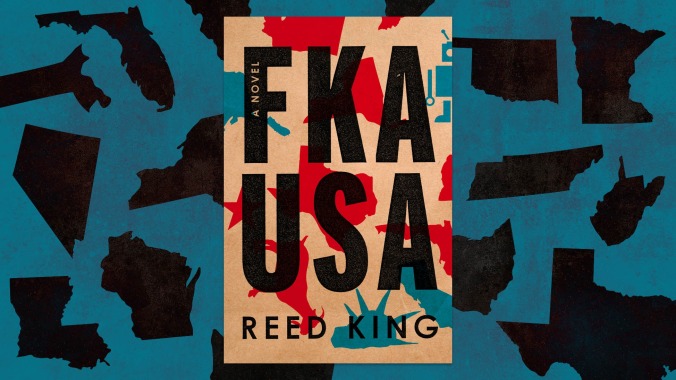You might associate the phrase “as above, so below” with an abysmal found-footage horror film, but it actually dates back to the Middle Ages, when alchemists believed small parts of the universe reflected the larger whole. Today, there is scientific evidence to support the idea of “microcosms” in nature and sociology, but the new post-apocalyptic sci-fi novel FKA USA offers some literary proof.
FKA USA is set in the 2080s, when the country “formerly known as the United States Of America” has fractured into nearly two dozen independent nation-states. Climate change has ruined the environment. Everyone is miserable, even the androids. But a 16-year-old factory worker can save the world if he safely transports a talking goat from Little Rock, Arkansas (now a fake-food factory town) to San Francisco.
Heading west through sometimes toxic, sometimes irradiated wastelands, accompanied by a female-identifying robot named Sammy and a cyborg named Tiny Tim, the factory worker and the talking goat (Barnaby) pass through all manner of end-times societies, including a group of satanists that mistakes Barnaby for Black Phillip himself. Overall, it’s a nice high-concept premise for a science fiction quest novel, if a bit trope-worn.
Now, the microcosm: The factory worker’s name is Truckee Wallace. He lives in a city called Crunchtown 407, in a country called “Crunch, United, Colonies.” Some of the other nation-states include “Sinopec TeMaRex Affiliated” and “Green Mountain Associated Intentional Communities.” The very first page of the book contains this bauble of a sentence: “Ever since Crunch, United, had made the swag stuff like Real-Friends® and Worldburn: Apocalypse illegal, there just wasn’t a point.”
Imagine, for a moment, what kind of whole would spring from these comically cumbersome parts. Imagine if it was 480 pages long with copious footnotes and five appendices, all full of viscous exposition. Somehow, it was published by a big five imprint and optioned by Warner Bros. for a feature film.
FKA USA is exhausting. Instead of telling a story, the author packs every page with as many convoluted world-building references and one-liners as possible. It feels less like a novel and more like a movie treatment crowdsourced by studio executives, who then passed the writing off to one of their teenage nephews. Perhaps that’s why FKA USA was published under a pseudonym, though the jacket copy assures us “Reed King” is a New York Times bestselling author and a TV writer.
Whoever wrote FKA USA, they’ve probably read George Saunders’ masterful short story “Jon,” and played one or more video games in the Fallout franchise. Like Saunders’ titular hero, Truckee Wallace has a few idiosyncratic speech patterns (“could of” instead of “could have”), and his narration attempts a similar volume of comedy. But Truckee mostly comes across as a juvenile asshole, and the “jokes” are more Adam Sandler than George Saunders.
“The problem with foreigners was simple: they carried disease,” Truckee claims in chapter one, which sounds like the kind of bias a hero will eventually have to confront, but there’s no time for that in FKA USA. He refers to the 2080s as “the sticky, smelly, post-climax part of human history,” and to government agents as “everywhere and nowhere, like a poisonous fart.” When he learns about his goat-delivering task to save the world, “the atmosphere curdled like piss.” If you think those lines are funny, you’ll find FKA USA hilarious.
There’s an ongoing debate about whether critics should even write negative reviews, and it’s only getting louder. No well-meaning writer enjoys panning the work of another, but anything other than an honest appraisal would turn critics into publicists, and the truth is—despite a great cover and a clever premise—there are Wikipedia pages more narratively compelling than FKA USA. The map on the endpapers is the best part of the book.
Were it not for the Warner Bros. deal, one might wonder if “Reed King” is the Alan Smithee of the publishing industry. But there is hope: If screenwriters can turn a book like The Martian into a great movie, perhaps the film adaptation of FKA USA will deliver on the premise.









































